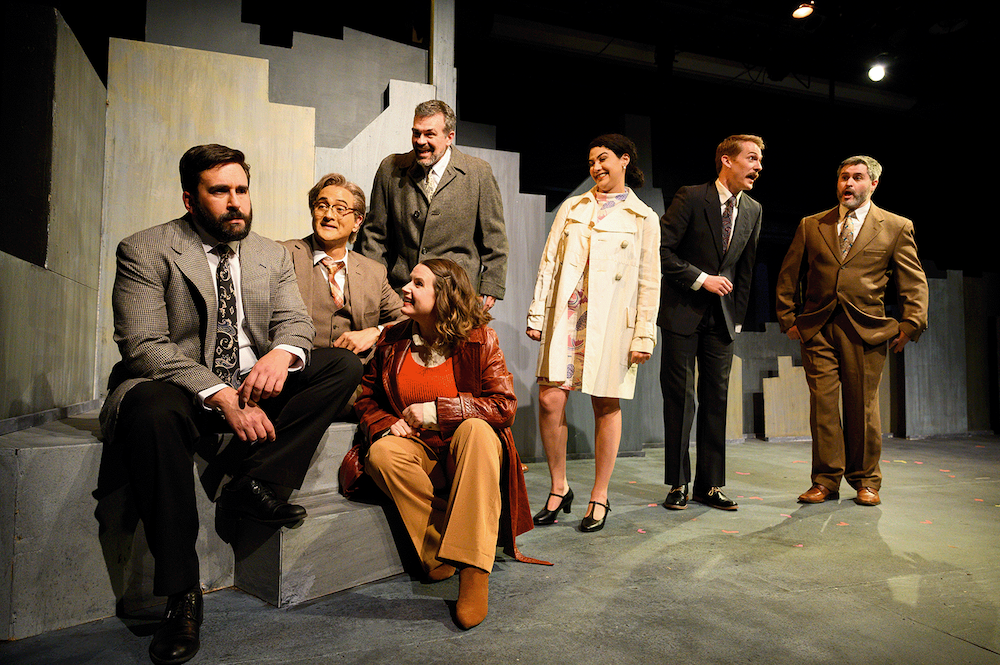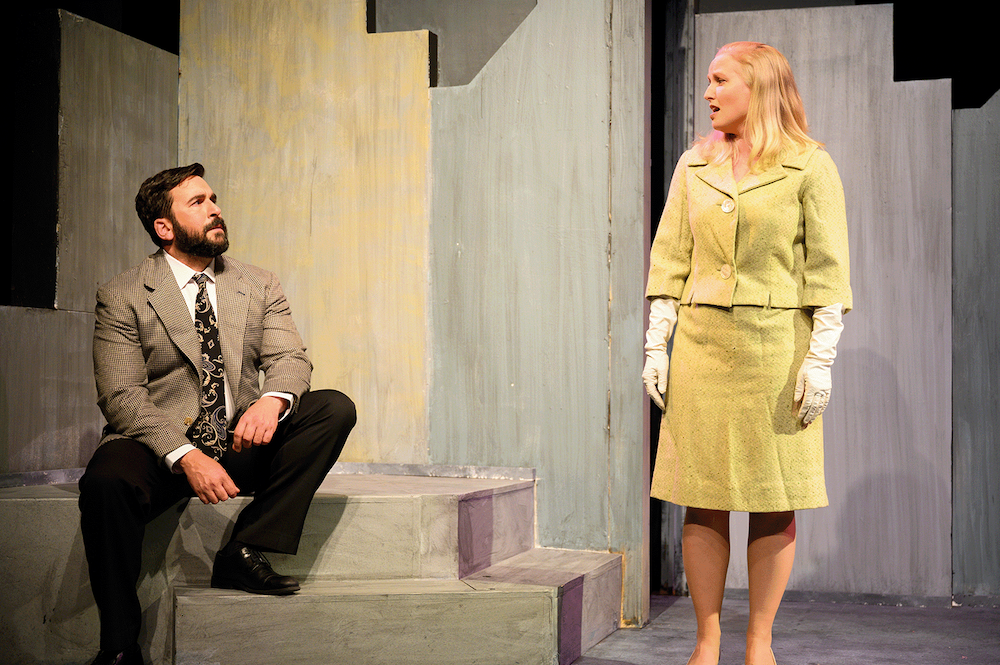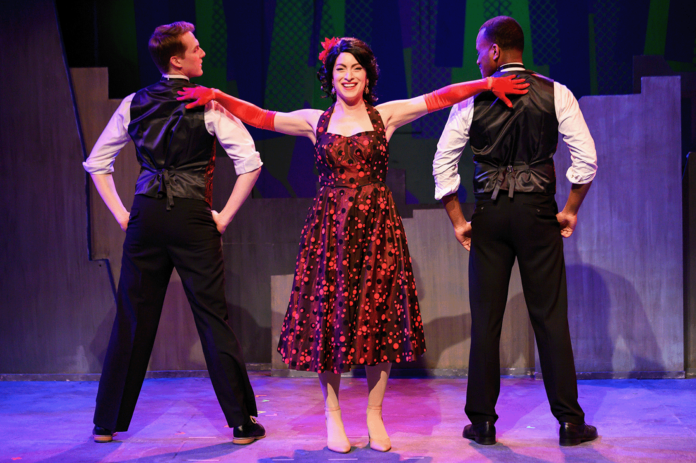Being a Covid-cautious theatre patron makes one incredibly sensitive to both their surroundings and the actions of others. Pre-pandemic, I’d hear an audience member cough and roll my eyes. Now, the sound makes me as hyper-attuned as a gazelle on the open plains.
I recall two distinctive coughing fits from the opening night performance of Merrily We Roll Along (through April 9 at the Gateway Theatre.) The first was from a man in the audience who didn’t have his mask on during intermission (I don’t know if he had it on during the performance proper, but he definitely ignored 42nd St. Moon’s mask mandate between acts, and stared at mine as if I were the oddball.) The second was onstage, when actor Sophia Alawi began hacking up a storm. Fortunately, the latter incident was due to the fact that the characters were smoking weed in an affluent NY penthouse.
As I watched this performance of the acclaimed Sondheim musical—which begins in 1976 and moves backwards two decades—I couldn’t help but wonder how future artists will comment on our still-ongoing pandemic the way these characters comment on the Vietnam war, New Hollywood, the Cold War, and even the launch of Sputnik. I am neither the first nor will I be the last to note the absence of Covid protections in contemporary pop art. One can only wonder how this era will be dramatized by those lucky enough to survive it, though they will be possibly stricken with Long Covid.

Hell, the 1981 musical that is the subject of this review is as old as I am; I wonder if it will outlive me?
Our story (with its book by George Furth, updated from the 1934 non-musical by George S. Kaufman and Moss Hart) follows successful Hollywood composer Franklin Shepard (Will Giammona) on a backwards journey through his career. It primarily tracks the ebbs and flows of his relationships with his two closest friends, collaborator-lyricist Charley Kringas (DC Scarpelli) and novelist Mary Flynn (Melissa Wolfklain.) Along the way, we learn of his long-term affair with starlet Gussie Carnegie (Christine Capsuto-Shulman), his failed marriage to former collaborator Beth (Juliana Lustenader), and what sort of thing can change a leftist NY theatre artist into a mercenary Hollywood regular. (Spoiler: it’s money. It’s always money.)
This being my first time actually watching Merrily…, I was reminded of the film The Bad and the Beautiful. Vincente Minnelli’s 1952 melodrama takes a Rashomon-style look at a Hollywood producer (Kirk Douglas), as his former friends (Lana Turner, Dick Powell, Walter Pidgeon) try to recall just when said producer transformed from the guy they all loved to the cut-throat bastard they all hate. I’m not a fan of how that film ends, but I love stories about the intersection of art and commerce, and how it affects relationships.
The paradox of selling out is that is that it can be incredibly easy once someone expresses real interest, especially if the person selling out doesn’t come from wealth. Indeed, the timelessness of Sondheim and Furth’s musical doesn’t come from its being part of the “industry insider” genre, but rather from the sincerity it brings to said genre (often represented by toothless flops like What Just Happened?) There’s a relatable frustration to watching Frank, Charley, and Mary try and create something pure on their typewriters and piano, even as they’re forced to take “real” jobs to keep the lights on. There’s an equal amount of pain and encouragement in those, since we already know the success and heartbreak in these characters’ futures. Capitalism would have us believe that we’re just one step away from untold riches, which we’d love to spend on the betterment of ourselves and others. But those lucky enough to attain those riches often get caught in the trap of worrying over whether it’ll all be taken away, bringing out one’s worst qualities. To paraphrase author Robert Caro, absolute power doesn’t corrupt so much it reveals who one really is. And Franklin Shepard is a dick who considers the work of his collaborators to be a stair step to his own success.

Still, it’s entertaining to watch the reverse trajectory of his moral decay. As directed by Dennis Lickteig, the Moon production assembles an ensemble of Bay Area musical regulars and newbies alike to bring the characters to life. They even got Juliana Lustenader to briefly come back from LA to illustrate the sadness and showmanship of Beth, Frank’s biggest wife and supporter, who is doomed to one day be his opponent in an ugly custody battle for their son (Keenan Moran.) Sondheim always poured a great deal of heartbreaking empathy into the women he wrote for, making the performances of Lustenader, Wolfklain, and Capsuto-Shulman the strongest in a story that sees them surrounded by men who only acknowledge them sporadically.
Help us save local journalism!
Every tax-deductible donation helps us grow to cover the issues that mean the most to our community. Become a 48 Hills Hero and support the only daily progressive news source in the Bay Area.
The entire ensemble brings the laughs and pain, but also the pipes. Though Moon could still benefit from mic-ing the cast, this show had fewer instances of voices being drowned out by Tania Johnson and Daniel Alley’s orchestrations.
One is grateful to Moon for keeping their mask mandate, even if they could do a better job at enforcing it. Despite the industrial-sized air purifier in the back of the theatre, the old building housing the Gateway still has poor ventilation, leading to CO² readings as high as 2220ppm on my Aranet4. One can’t help but think of this, knowing that displacement ventilation (aka “those old ‘mushroom vents’ you see under seats in older theatres”) became prolific in direct response to the 1918 Influenza.
Hindsight may be 20/20, but it’s also in slow-motion: you see all your mistakes clearly and, armed with contemporary knowledge, you would love to believe you could change it in time. After 42 years, Merrily We Roll Along certainly handles the reverse time jump better than Christopher Nolan ever did. What’s more, Moon brings together a fine ensemble for one of the late composer-lyricist’s best works. One leaves the show with pleasant memories of the performers onstage, even as the modern world ignores the massive threat off-stage.
MERRILY WE ROLL ALONG runs through April 9. Gateway Theatre, SF. Tickets and more info here.





